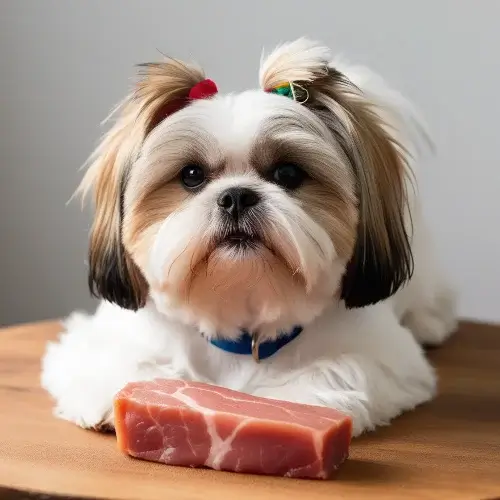Do Shih Tzu Eat Pork? Comprehensive Guide

Feeding your Shih Tzu can bring a lot of questions, especially when it comes to meats like pork. Do Shih Tzu eat pork? The answer is yes, but only if it’s given in the right way. Pork can be a delicious treat for your furry friend, but there are important guidelines to follow. This blog will explore whether pork is safe for small dogs, its benefits, risks, and how to safely include it in their diet.
Table of Contents
Is Pork Safe for Small Dogs Like Shih Tzu?
Benefits of Pork in a Dog’s Diet
Pork is a high-quality source of protein, which is essential for muscle development and energy in dogs. It also contains nutrients like thiamine, which supports their metabolism and nervous system. For Shih Tzus, a small piece of plain, cooked pork can be a satisfying treat.
As I’ve noticed with my own dogs, they thoroughly enjoy small bits of lean pork. “Sometimes, just one tiny tidbit can light up their day.” This makes it a good occasional addition to their diet when prepared correctly.

Risks of Feeding Too Much Pork
While pork is healthy in moderation, overfeeding or choosing the wrong type of pork can lead to serious problems:
- Salt toxicity: Processed pork, like bacon or sausages, contains high salt levels that are harmful to dogs.
- Pancreatitis: High-fat pork can inflame the pancreas, causing pain and digestive issues.
- Obesity: Overfeeding fatty pork can lead to unnecessary weight gain in small dogs.
“I’ve seen how processed pork, like hot dogs, can upset a dog’s stomach. I’ve learned that sharing your plate with your Shih Tzu is not a smart idea!”
Common Sense Guidelines for Feeding Pork
To keep your Shih Tzu safe, follow these simple rules:
- Avoid processed pork like sausages, bacon, or flavored pork products.
- Cook pork thoroughly to eliminate bacteria or parasites.
- Remove excess fat and bones, as they can harm their digestive system.
- Stick to small portions of plain, lean pork to avoid health risks.
Homemade Dog Food: Including Pork Safely
Balancing Nutrients in Homemade Dog Food
Homemade dog food can be a fantastic way to ensure your Shih Tzu gets a balanced diet. If you include pork, pair it with low-fat ingredients like boiled rice and vegetables.
To keep your dog healthy, use low-sodium pork products and avoid fatty cuts. A meal with lean pork, carrots, and green beans is a simple and healthy option.
Personal Example: Preparing Dog Food with Pork
“I’ve been making my own dog food for years. It’s cheaper, healthier, and I can control what goes into my dog’s meals.” For example, I had a pit bull on steroids for a time, which increased his muscle mass. To manage this, I adjusted his diet to include less protein and added more water.
Similarly, with Shih Tzus, you can customize their meals. Keep portions small, balance protein with vegetables, and avoid high-fat pork.
Pork as a Backup Option
While my preference is for lean meats like chicken or rabbit, pork can be a practical option when other meats aren’t available. “If the butcher shop only has pork, I’m okay with it. Dogs are natural meat eaters, and as long as it’s balanced, pork can work.”
Feeding Pork to Shih Tzu: What You Need to Know
Consider Your Dog’s Size and Health
Shih Tzus are small dogs with specific dietary needs. Overfeeding them—even with healthy foods—can lead to digestive problems or weight gain. Portion control is critical.
Start by giving your Shih Tzu a small amount of cooked pork. Watch for any signs of allergies, such as vomiting or diarrhea. “Paying attention to how your dog reacts to new foods is key to ensuring their happiness and health.”
Preparing Pork Properly for Your Dog
Follow these preparation tips for safe feeding:
- Cook pork thoroughly to kill bacteria and parasites.
- Avoid salt, spices, or marinades, as they can harm your Shih Tzu.
- Trim off excess fat, which can lead to pancreatitis.
Tips for Feeding Dogs Pork Without Risks
Moderation is Key
Feeding pork to your Shih Tzu occasionally is fine, but it should never be their primary protein source. Use it as a treat or a small addition to their meals. “I’ve found that a little pork goes a long way in keeping dogs happy without risking their health.”

Read Labels and Know Ingredients
When buying pork, always check the labels. Low-sodium options are the safest choice for your Shih Tzu. Avoid processed or seasoned pork products entirely.
Quick Safety Tips
| Do | Don’t |
| Use plain, lean pork | Feed processed meats |
| Cook pork thoroughly | Add salt or seasonings |
| Serve in small portions | Overfeed or use fatty cuts |
| Monitor your dog for reactions | Ignore signs of discomfort |
Conclusion
So, do Shih Tzu eat pork? Yes, they can! When fed in moderation and prepared properly, pork can be a safe and enjoyable addition to your dog’s diet. However, common sense is key—stick to plain, cooked pork and avoid processed or fatty cuts.
By following these tips, you’ll ensure your Shih Tzu stays happy, healthy, and full of energy. Always remember to consult your veterinarian before making any significant changes to your dog’s diet. With the right approach, pork can be a delicious and healthy treat for your furry companion.
FAQs
What type of pork is safe for small dogs?
Only lean, plain, and thoroughly cooked pork is safe. Avoid processed options like bacon or sausage, as they contain high levels of salt and fat, which can harm your dog.
Can pork be used in homemade dog food?
Yes, homemade dog food with pork can be a nutritious option. Balance it with low-sodium ingredients like rice and vegetables. Always remove fat and bones, and cook pork thoroughly before adding it to meals.
What are the risks of feeding pork to dogs?
The benefits and risks of pork for dogs depend on preparation. Risks include pancreatitis from fatty cuts, salt toxicity from processed pork, and choking hazards from bones. Always opt for lean and plain pork to avoid these issues.
Are there low-sodium pork recipes for dogs?
Absolutely! Low-sodium dog food recipes can include boiled pork combined with rice, carrots, and green beans. This provides a balanced meal while ensuring your Shih Tzu enjoys a healthy diet without added salts or fats.






